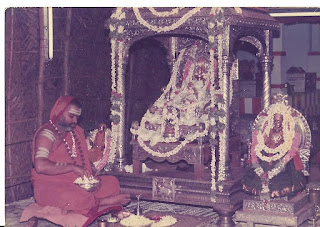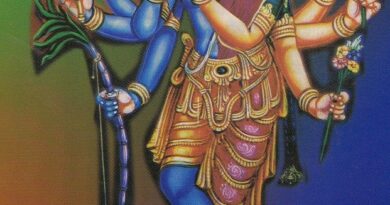Sringeri : The Jagadguru and the unbroken Heritage
The holy town of Sringeri is a must visit for any sincere seeker who wants to spend his time in company of nature and in the most traditional environs. This town and its culture will definitely take you back by atleast 200 years. Situated in the midst of Agumbe forests the river Tungabadra flows through this town.Access to this place was very restricted till recently.This is one of the important pilgrimage centers in Karnataka but travellers should spend a few days if they want to explore all the places.
Sri Sharada Temple
– Originally established by Sri Adi Sankara, the deity was made of Sandalwood. Later on, one of the acharya installed the golden idol. Navarathri is the main festival here. But round the year, some festival or the other happens here or in any of the temples or the mutt.
Sri Vidyashankara Temple
– One of the acharyas (Sri Vidyasankara) wanted to perform austerities inside a cave. He asked his disciples to close the entrance to the cave and never to open it, unless there was an explicit instruction.
But after 12 years, one of his disciples opened it out of curiosity. He was shocked to find a partially formed Shivalinga there.This temple has been built on top of the Siva Linga. It also has the original sandal image of Sri Sharada.
Sri Malayala Brahma Temple – The legend behind this shrine is very interesting. This deity is actually brahma rakshas. It accompanied the acharya, Sri Sri Vidyaranya during his travels. It is said that he had established this shrine.
Other shrines around the Vidya Shankara temple are Sri Jnardhana Swami, Sri Bala Subramanya etc.
The Adishtanams of some of the previous acharyas are also located here.
Sri Malahanikeshwara or Mallikarjuna Temple – It is an ancient Shiva temple located in the middle of the town.
Sri Adi Sankara Temple – It is a very recent one built by the current acharya Sri Sri Bharati Tirtha
Sri Chaturmurtishwara temple is located in Simhagiri near Sringeri (now called as old Sringeri).
Kigga is a town nearby which has the Rishya Sringa temple. Here devotees offer prayers for rain.
Temples of the guardian deities – As a protection to the holy Sringeri town, Adi Sankara had installed four deities on the 4 corners of the village.
- Kala Bhairava Temple in the East : This is the temple where Sri Sri Abhinava Vidya Teertha Mahaswamigal and Sri Sri Chandrasekara Bharathi Mahaswamigal used to perform their sadhana.
- Kere Anjaneya Temple in the West
- Kalikamba Temple in the North
- Durgamba Temple in the South
Sringeri is the base location of the Sringeri Sharada peetam established by Sri Adi Sankara and has an unbroken line of sages heading the monastery.The Adhishtanams of the Shankaracharyas are located inside Narasimha Vana and near the Sharada temple making it an excellent place for meditation and chanting. As the name implies, the Narasimha Vana is almost like a forest. In fact, we can notice boards there cautioning people about snake movement.
The current acharya performs Chandramouleeswara Shiva puja in the night (around 8-8:30 PM) at a hall in the Narasimha vana and all devotees can witness it in its full glory.
The Mutt also performs Homams,Yagnas very frequently all over India in its various branches. Especially in Sringeri, you can find some Yagna or the other happening for general welfare or on specific request from Individuals.There is a dress code to be followed, so please check before visiting this puja place.
It may not be possible to cover this entire place in 1-2 days. A week’s stay can help you enjoy the nature, visit the temples and visit some of the nearby temples as well.
This article is being posted just to know how the Jagadguru Sri Sri Bharati Tirtha Maha Swamigal spends his day. How many of us can even get 10% close to his kind of schedule?
Mutt administrator Gowrishankar offered this summary of a typical day in the life of the Pontiff. The Jagadguru has only one meal each the day and nothing else in-between. Occasionally, he may take a glass of milk in the morning after worship. He regularly practices yoga. Even when he is travelling, he does not stop the routine worship, meditations and pujas. It therefore takes three to four days even to reach Bangalore (192 miles) because he does not travel for more than two to three hours in a day, to ensure that this routine is not upset. Even VIP meetings are fixed during his regular meeting time in the evening and not during any other slot which may come in the way of religious duties.


4:30 am: Guruji arises
5:00: First bath
5:15: Morning observances, anusthana, a routine of worship and meditation
7:30: Offers puja worship to the sandals of his guru
8:00: Conducts class for the students of the priest training school. In October, 2000, he was teaching tarka, the science of Vedic reasoning, his favorite subject.
9:00: Personal studies
9.30: Comes out to give darshan, audience with devotees. This may continue until noon, depending on the number of people. If it is a Friday, he goes to the temple during this period to worship Goddess Sharada.
noon: Second bath, midday prayers and meditation.
1:30 pm: Visits the samadhi temples of his gurus, then goes for his lunch
2:30: Short break
3:00: The Jagadguru teaches class for the scholars and pundits. These are brainstorming, intellectual sessions on various subjects.
4:15: He attends personally to the letters he has received in his name
5:00: Swamiji comes out to give audience to devotees.
6:30 Meets with the Mutt’s
administrator to discuss the day’s business
7:00: Short break
7:30: Bathes and performs his evening worship and meditations.
8.15: Performs puja to Chandramouleswara and other Deities which have been traditionally worshiped by all previous Jagadgurus back to Adi Sankara. Done without fail every day.
10:00 Jagadguru retires to his chambers and continues his personal study
11:30: Rest
Source: Hinduism Today Magazine
Location: Sringeri, Karnataka 577139, India

